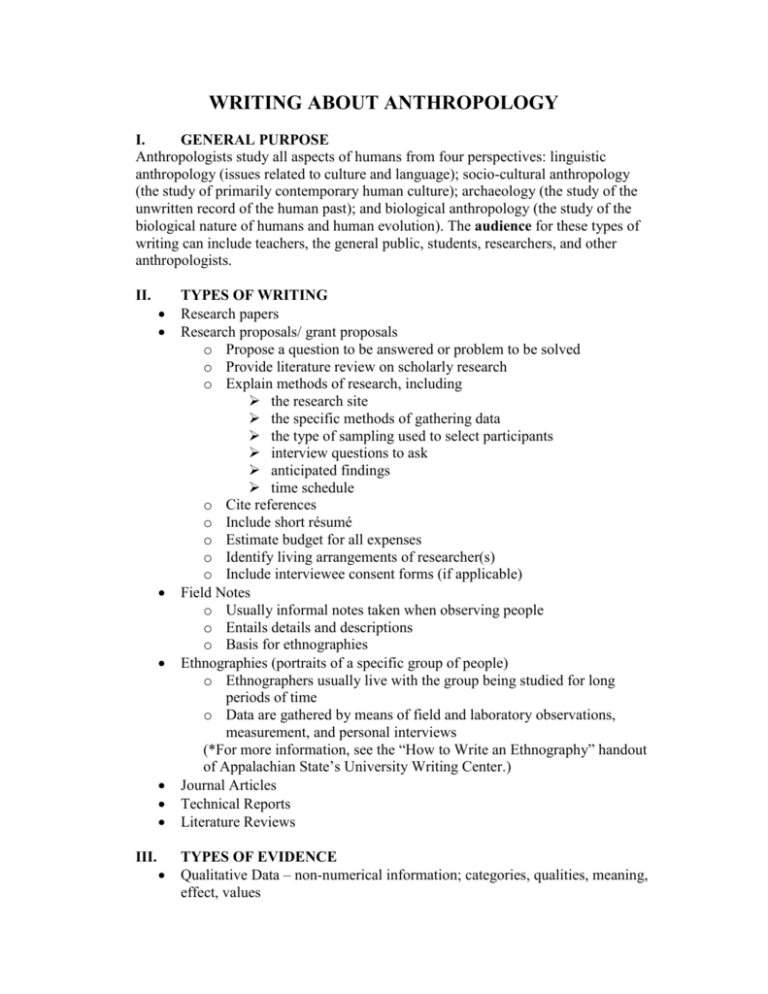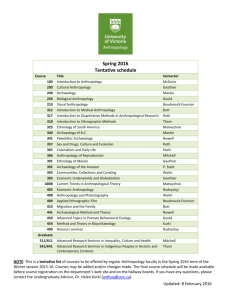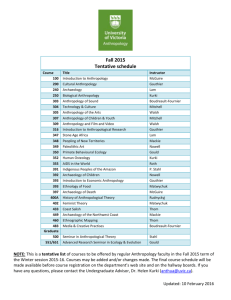Writing About Anthropology - Writing Across the Curriculum
advertisement

WRITING ABOUT ANTHROPOLOGY I. GENERAL PURPOSE Anthropologists study all aspects of humans from four perspectives: linguistic anthropology (issues related to culture and language); socio-cultural anthropology (the study of primarily contemporary human culture); archaeology (the study of the unwritten record of the human past); and biological anthropology (the study of the biological nature of humans and human evolution). The audience for these types of writing can include teachers, the general public, students, researchers, and other anthropologists. II. III. TYPES OF WRITING Research papers Research proposals/ grant proposals o Propose a question to be answered or problem to be solved o Provide literature review on scholarly research o Explain methods of research, including the research site the specific methods of gathering data the type of sampling used to select participants interview questions to ask anticipated findings time schedule o Cite references o Include short résumé o Estimate budget for all expenses o Identify living arrangements of researcher(s) o Include interviewee consent forms (if applicable) Field Notes o Usually informal notes taken when observing people o Entails details and descriptions o Basis for ethnographies Ethnographies (portraits of a specific group of people) o Ethnographers usually live with the group being studied for long periods of time o Data are gathered by means of field and laboratory observations, measurement, and personal interviews (*For more information, see the “How to Write an Ethnography” handout of Appalachian State’s University Writing Center.) Journal Articles Technical Reports Literature Reviews TYPES OF EVIDENCE Qualitative Data – non-numerical information; categories, qualities, meaning, effect, values IV. V. o Interviews o Observations (field notes) o Other written documents (books, journals, newspapers, magazines, etc.) o Formal and informal interactions o Language Quantitative Data – information that can be expressed numerically o Facts containing numbers o Statistics o Numbers of people or things Past ethnographies or research WRITING CONVENTIONS Base research on credible, reliable sources. Credit the use of others’ work. Emphasize data, but also make the writing interesting for your audience. Use active voice. Include visual aids when possible (images, tables, charts, kinship diagrams, etc.). Write in first person to refer to observations or when writing field notes. Avoid judgmental, offensive, and ethnocentric language. TERMS / ACRONYMS / CONCEPTS o AAA: American Anthropological Association o Archaeological Anthropology o Biological Anthropology o Cultural Anthropology o Ethnography o Field notes o o o o o o o o Linguistic Anthropology Literature review Participant observation Qualitative data Quantitative data Research methods Emic vs etic Sampling VI. CITATION STYLES AAA (American Anthropological Association) uses o Chicago Manual of Style (CMS) o Merriam Webster’s Collegiate Dictionary SAA (Society for American Archaeology) ***** Sources Cuba, Lee. A Short Guide to Writing About Social Science. 4th ed. New York: Longman, 2002. Print. Driscoll, Dana Lynn and Brizee Allen. “Resources for Documenting Sources in the Disciplines.” Purdue OWL. 4 June 2012. The Writing Lab and OWL at Purdue University. Web. The Writing Center at the University of North Carolina at Chapel Hill. "Handouts: Anthropology." The University of North Carolina at Chapel Hill. 2013. Web.











